by Landon Mion
Restrictive abortion laws in several GOP-led states will now be, or soon will be, enacted following the court's decision
The U.S. Supreme Court handed down its decision Friday morning overturning the 1973 abortion decision Roe v. Wade, which now allows states to make their own abortion laws, and pro-life and pro-choice activists have taken to the streets in cities across the U.S. to allow their voices to be heard.
Pro-life activists showed up in U.S. cities in celebration of restrictive abortion laws that are now, or will be soon, enacted in a number of GOP-led states following the court's decision while pro-choice demonstrators protested what they see as an attack on reproductive rights.
Washington, D.C.
Outside the Supreme Court in the nation's capital, thousands of activists, both in favor of and in opposition of the ruling, arrived with signs in support of their cause.
Pro-choice protestors began participating in chants voicing frustrations over Friday's ruling. At one point, New York Democratic Rep. Alexandria Ocasio-Cortez joined a crowd calling the court, "Illegitimate!"
Protestors also burned an American flag in northwest D.C. Signs near the burning flag read "F--k MPD" and "F--k you Thomas, Alito, Coney Barrett, Kavanaugh, Gorsuch, Roberts."
PRO-CHOICE PROTESTORS BURN AMERICAN FLAG IN STREETS OF WASHINGTON DC AFTER ROE V. WADE REVERSAL
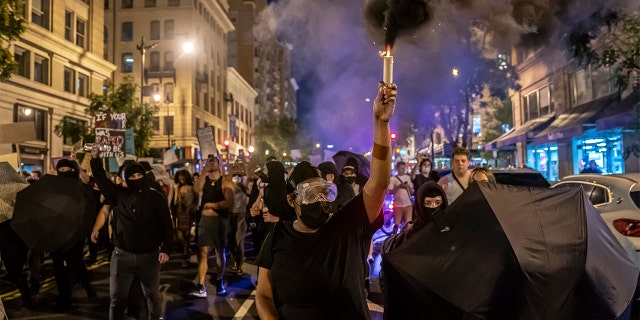
Pro-choice activists gather in protest following the announcement to the Dobbs v Jackson Women's Health Organization ruling on June 24, 2022, in Washington, DC. (Nathan Howard/Getty Images)
Abortion laws in D.C. are among the least restrictive in the country, allowing the procedure in all stages of pregnancy, including late-stage and third-trimester abortions.
New York City, New York
Dozens of pro-choice protestors were arrested in New York City after an estimated 17,000 people demonstrated in the Big Apple.
Protestors were heard shouting "My body, my choice" while holding signs that read "Keep your laws off my body" and "No uterus, no opinion."
Abortion access in New York is protected under the 2019 Reproductive Health Act. Democratic Gov. Kathy Hochul recently expanded protections for abortion patients and providers in preparation of the court's ruling.

Pro-choice protestors carry signs in New York City following a Supreme Court decision to overturn Roe v. Wade. (Credit: John Mantel for Fox News Digital) (John Mantel)
SUPREME COURT OVERTURNS ROE V. WADE IN LANDMARK ABORTION DECISION
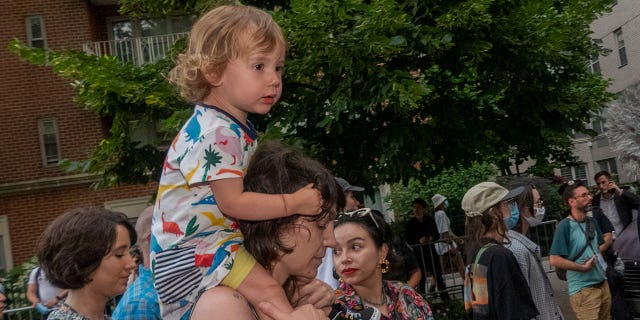
A child sits on his guardian's shoulders during a New York City protest after a Supreme Court decision overturned Roe V. Wade. (Credit: John Mantel for Fox News Digital) (John Mantel)
Los Angeles, California
A crowd of demonstrators had formed in downtown Los Angeles to protest the ruling, with some violent altercations reported between protestors and police.
Protestors were said to have thrown rocks and set off fireworks near officers while SWAT teams launched non-lethal bullets at demonstrators. Police declared an unlawful assembly. Arrests were made in connection to the protests, but the number of apprehensions has not been released.
Large protests also formed in Hollywood and West Hollywood, which were largely peaceful.
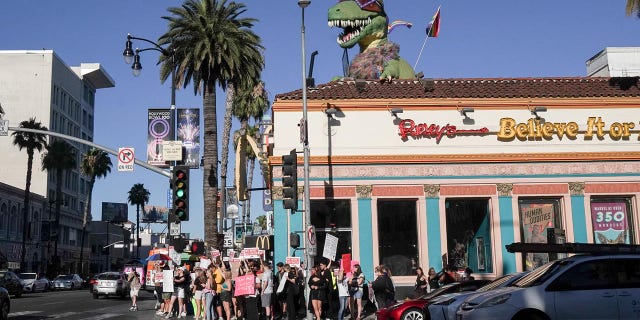
A crowd gathers to protest the U.S. Supreme Court opinion overturning of Roe v. Wade on June 24, 2022 on Hollywood Boulevard. (Photo by Emily Molli/Anadolu Agency via Getty Images) (Photo by Emily Molli/Anadolu Agency via Getty )
Dozens of people blocked traffic during rush hour Friday when they walked onto the 110 freeway.
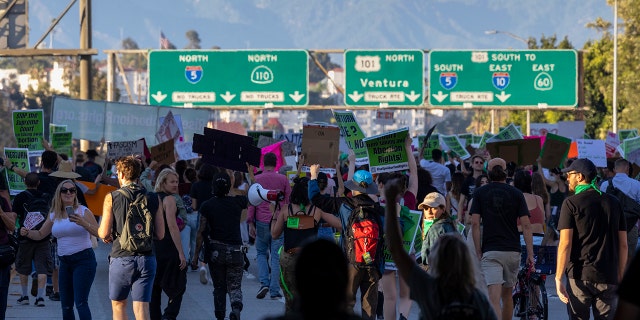
Protesters march northbound on the 110 Freeway to denounce the Supreme Court's decision in the Dobbs v Jackson Women's Health case on June 24, 2022 in Los Angeles, California. (Photo by David McNew/Getty Images)
California is one of the Democratic-led states where abortion access will remain readily available. Gov. Gavin Newsom also signed legislation Friday to protect patients and providers in California from other states' restrictions.
"We will not cooperate with any states that attempt to prosecute women or doctors for receiving or providing reproductive care," he said Friday.
Chicago, Illinois
Streets were closed in Chicago as demonstrators marched in protest of the ruling.
Protestors were seen gathered at Federal Plaza ahead of a large march. Some demonstrators were holding signs reading "No abortion bans, not now, not ever!" and "I dream one day women will have the same rights as guns."
Illinois already ensures women can have an abortion even after the court's ruling, and Democratic Gov. JB Pritzker called a special session following the decision to expand abortion access.
Phoenix, Arizona
A protest at the state Capitol in Phoenix resulted in property damages and an arrest, and authorities had to end the demonstration by dispersing tear gas in the area.
Arizona Department of Public Safety spokesman Bart Graves told KTAR News 92.3 FM that one person had been arrested and multiple Senate doors and memorials had been damaged in the protests railing against the court's ruling on abortion.
An estimated 8,000 people showed up to the state Capitol to protest the reversal of Roe v. Wade. Law enforcement ended the demonstration and declared it as unlawful assembly about two hours after the gathering began. Protestors would then proceed to the Senate building, where police in riot gear protected the front doors of the building.
ARIZONA ABORTION PROTEST: POLICE RELEASE TEAR GAS, LAWMAKERS ‘HELD HOSTAGE’ IN SENATE BUILDING
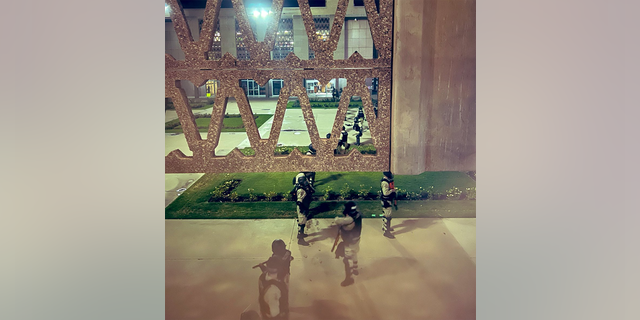
Law enforcement is forced to deploy tear gas to disperse protesters outside the Arizona Capitol after the Supreme Court's decision to overturn the landmark Roe v. Wade on June 24, 2022. (Rep. Sarah Liguori) (Rep. Sarah Liguori)
Arizona has two abortion laws, one from before it became a state and one signed earlier this year. The old law subjects anyone who performs an abortion to two to five years of prison time. And the new law, signed GOP Gov. Doug Ducey in March, would ban abortions after 15 weeks of pregnancy except in cases to save the mother’s life. Physicians face potential felony charges and loss of their professional licenses if they violate the law.
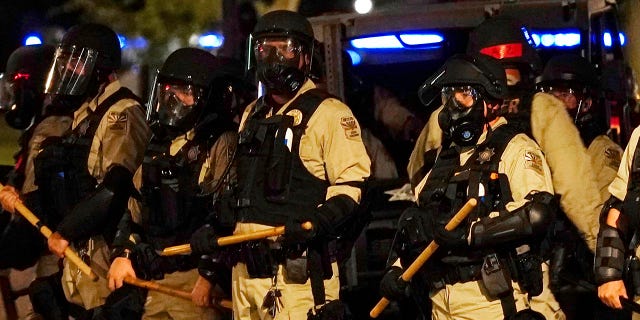
Police in riot gear surround the Arizona Capitol after protesters reached the front of the Arizona Sentate building as protesters reacted to the Supreme Court decision to overturn the landmark Roe v. Wade abortion decision Friday, June 24, 2022, in Phoenix. (AP Photo/Ross D. Franklin) (AP Photo/Ross D. Franklin)
The new law is scheduled to take effect 90 days after the state Legislature adjourns its current session, which could happen by the end of June. However, it is unclear which law takes precedence.
Austin, Texas
Hundreds of people gathered in Austin on Friday to protest the court's ruling as abortions in the state have now ceased.
"We refuse to accept the Supreme Court’s decision to strip our right to abortion," the group, TX4Abortion wrote on social media. "No going back. No surrender."
The Austin police chief encouraged demonstrators to peacefully protest.
Texas has a trigger law banning abortions in the state from the moment of fertilization that will go into effect 30 days after the Supreme Court’s judgement except in cases where the life of the mother is at risk or if they risk "substantial impairment of major bodily function."
Abortions in Texas are already banned after six weeks of pregnancy following last year's enactment of Senate Bill 8, which relied on private citizens to sue anyone who aided and abetted an abortion. The law significantly reduced abortions in the state.
St. Louis, Missouri
In St. Louis, demonstrators on both sides of the issue gathered outside Missouri's only remaining Planned Parenthood in the hours after the court's decision.
Abortion is now illegal in Missouri except in instances when the mother's life is in danger.
Pro-life group Defenders of the Unborn gathered in prayer and held a rally celebrating the court's decision. The activists held signs reading "Choose life" and "Supreme Court: Overturn Roe!"
"I never thought I would see this day when Missouri would not kill its children," Defenders of the Unborn president Mary Maschmeier told KSDK. "It's a wonderful celebration."
Pro-choice rights activists could be seen chanting at those supporting the ruling, "My body, my choice!"
Missouri Democratic Rep. Cori Bush, who was at the Planned Parenthood location for a news conference when the decision was delivered, said "It is health care and it's nobody's, it's nobody's else's decision."
Atlanta, Georgia
Downtown Atlanta became filled with pro-choice protestors after the court's decision, stretching from Centennial Park to the steps of the Georgia state Capitol.
"I think we are out here to stand up to what we believe in. we can stay at home and cry all day. Which we did but we are out here letting our voices be known," one protester told FOX 5 Atlanta. "Next is revolution. Getting out in the street. It’s not time to sit back right now. Use your voice."
Supporters of the ruling celebrated in Atlanta, although their turnout was minuscule in comparison to the pro-choice demonstrations. They said a bigger rally would take place on Saturday.
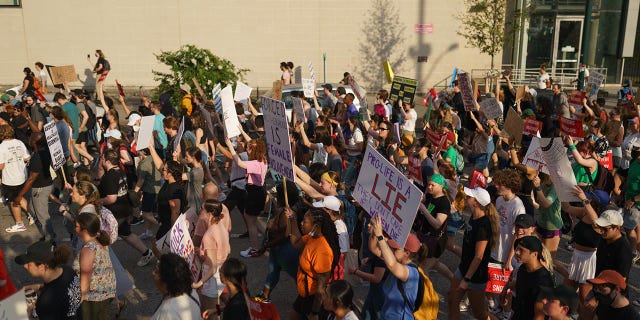
People march to protest the Supreme Court's decision in the Dobbs v Jackson Women's Health case on June 24, 2022 in Atlanta, Georgia. (Photo by Elijah Nouvelage/Getty Images)
Georgia's Heartbeat Abortion Bill, which was signed into law in 2019 before a court ruled it was unconstitutional, bans the procedure once a heartbeat is detected, which is usually about six weeks into a pregnancy, and allows mothers of unborn children to collect child support from fathers. The law allows exceptions for rape and incest.
Boston, Massachusetts
Pro-choice protestors in Boston marched and staged a sit-in on the city's streets following the court's ruling.
Moderate Republican Gov. Charlie Baker signed legislation after the ruling to protect abortion providers who perform on women from other states. Under the executive order, Massachusetts will not cooperate with any investigations from other states regarding abortion.
"In light of the Supreme Court’s ruling overturning Roe v Wade, it is especially important to ensure that Massachusetts providers can continue to provide reproductive health care services without concern that the laws of other states may be used to interfere with those services or sanction them for providing services that are lawful in the Commonwealth," he wrote in a statement.
Massachusetts codified Roe v. Wade into law in 2020 following the appointment of Supreme Court Justice Amy Coney Barrett. The ROE Act expanded abortion access for 16 and 17-year-olds without parental consent, and allows the procedure to be performed after 24 weeks of pregnancy in some cases.
Landon Mion
Source: https://www.foxnews.com/politics/protests-us-supreme-court-reverses-roe-v-wade







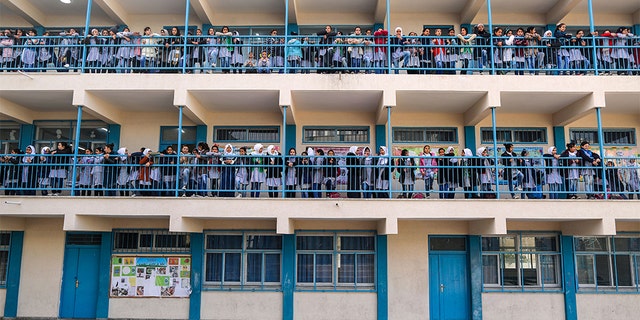
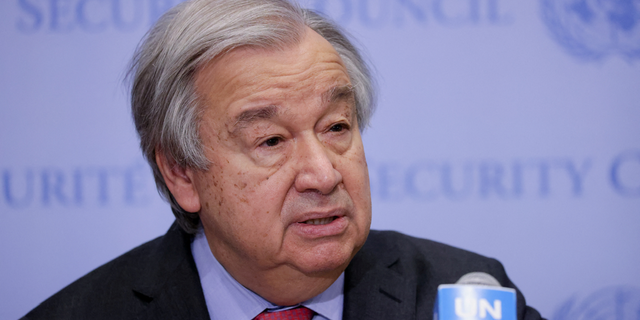
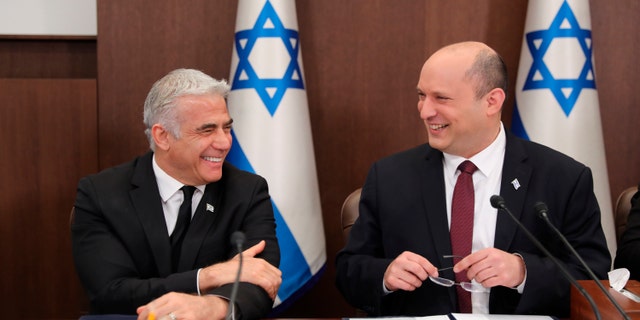



 از نگاه شما- بازنشستگان معترض در دورود: «وعده، وعید چه خوبه، ولی همش دروغه».
از نگاه شما- بازنشستگان معترض در دورود: «وعده، وعید چه خوبه، ولی همش دروغه».



